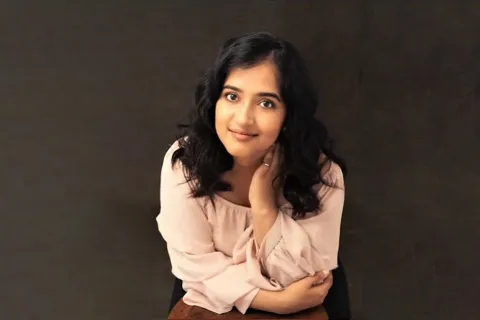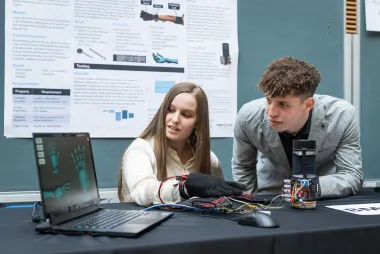"It seems to me that exploring the world, is the best way to find your place in it. And once you start exploring, you will being to see how limitless the opportunities are to make it better, more sustainable, accessible and inclusive."

Rashmi Prakash
- Degree:
- Master of Engineering
- Grad year: 2021
- Program:
- Campus: Vancouver
Hi! My name is Rashmi, and I was born in India, raised in Wales and Canada. I moved out to UBC from Ontario after high school and it was the best decision I could have made! I completed my undergraduate degree in electrical engineering, biomedical option and my masters in Biomedical Engineering. Throughout my degree, I was involved in various extracurriculars from concrete tobogganing, to the biomedical engineering student team (BEST), to volunteering with crocodiles, parrots and rabbits. I was able to take a wide variety of courses along with my core electrical and biomedical courses such as forensic anthropology, zoological physics, and obstetrics courses. What this allowed me to do was explore the many amazing possibilities for applying my engineering skills, learn about the problems faced in different fields, as well as learn many different perspectives and approaches to problem solving. Besides school, I’m a huge fan of the outdoors— whenever I’m not doing school work, I’m out hiking and camping in BC's beautiful mountains, or paddling on the lakes.
Why did you choose to go into your field of study at UBC?
My path to Biomedical Engineering started when I was quite young! I was really interested in genetic engineering when I was young and wanted to genetically engineer a giant dragon that would fly across the world and would breath in the green house gases and breath out oxygen for us haha! But as I grew up, I started seeing and doing things that all inevitably lead me to where I am today. My first job was with the City of Brampton, as a special needs camp councillor. I took the job because it seemed fun, but I had no idea how much it would change my life. I met some incredible people with disabilities who really challenged the incorrect perception of disabilities that I had— they showed me how poorly engineered the world is, and how immensely courageous and determined these people are to live life as normally as possible. This was a huge motivation for me to be in Biomedical Engineering. I recall seeing my grandmother struggle with and pass away from diabetes when I was younger. And I remember talking about this in my undergraduate application, but in the middle of an Ontario winter, I once found this rabbit that had been hit by a car and had badly injured an eye and their back legs. My little brother and I had tried to nurse it back to health and build it a little wheelchair. For me, I think the biggest motivation for getting into biomedical engineering is the feeling of helplessness when watching other people struggle.
What has made your time at UBC memorable?
The most memorable part of my time at UBC is without question the people I’ve met, including my peers, professors and staff. Throughout both my undergraduate degree and masters degree, I feel incredibly lucky to have met people that are so hardworking, brilliant and continue to push me to be my best self. Those that are still in the program or are just joining will definitely find that the group projects and the late night projects that you find yourself working on with your peers are going to be the memories that you remember the most. These are going to be the people that you will stay in touch with when you graduate, and those who will support your career and personal growth. Apart from the skills that I’ve gained at UBC, I’ve also gained an incredibly wonderful family.
What advice would you give a student entering your degree program?
I have no doubt that biomedical engineering is the future. It’s the best integration of biology and engineering, and there is room for so much collaboration with many other programs that is difficult to do outside of biomedical engineering. Health is Wealth has never been truer— especially during this pandemic as we’ve realized how important our health is. People are beginning to take their health into their own hands, and there is such a great market for health tech. The future of biomedical engineering is sustainable and personalized healthcare— and I’m really excited for it! But in order for a student to be successful in this program, students have to take initiative! The instructors and staff are amazing and supportive, but no one is going to hold your hand. There are an enormous amount of opportunities just waiting around to be taken, and students just have to push themselves out of their comfort zone and take initiative to ask for these opportunities.
Where do you find your inspiration for using your degree to make an impact on our world?
I am fortunate to have some amazing mentors in both the biomedical field and entrepreneurial field that take the time to talk to me about the problems that I notice, and the ideas that I have for solutions. My inspiration to use my Biomedical Engineering degree to make an impact comes from watching people struggle, whether it is struggling with complete certain tasks or struggling with their health. As technology improves, the components get smaller and manufacturing equipment gets more precise— the sensors and tools that we can build improves in capability and quality, allowing us to accomplish many feats that we could only dream of in the past. My goal is focus the development of these technologies to create sustainable technologies that will improve the quality of health. I am currently working on a number of projects including developing fetal health monitoring systems and sustainable menstrual products, and I’ve been so fortunate to be supported by not only my mentors, but also family and friends.
How has your identity informed your academic and professional experiences within your field at UBC and beyond?
I am a person of colour in a field where women, especially women of colour, are underrepresented and often not taken seriously. I’ve had a bus driver refer to my toolbox as a weird looking makeup case, and when purchasing a technical book at a bookstore, I was asked if it was for my father, brother or boyfriend. The biggest thing that the School of Biomedical Engineering has done for me is help me grow my confidence as an engineer. In my undergraduate degree, there were at most maybe 15 women for every 100 men in my classes, and only two of my instructors were women, so for the longest time, I had subconsciously experienced imposter syndrome— constantly questioning my capabilities as an engineer, hesitating to complete the technical parts of the project, or feeling like I had to explain things more than my male peers to prove that I also understood. But seeing so many brilliant female engineers as a part of the faculty team has unintentionally really helped with that! I’ve never understood how important representation is until now. I am keen to help the future generations of women engineers be more confident in the their capabilities.
